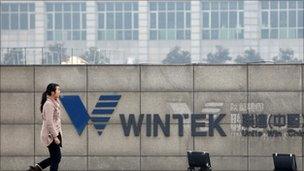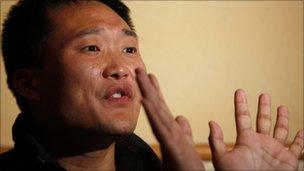'Poisoned' Chinese workers turn to Apple for help
- Published

Wintek makes touchscreens on contract for Apple and other mobile firms.
Chinese workers injured while making touchscreens for mobile devices, including iPhones, have written to Apple asking it to do more to help them.
Some 137 workers suffered adverse health effects following exposure to a chemical, known as n-hexane.
They claim that the Taiwanese factory owner has not given them enough compensation.
Apple did not offer comment on the letter.
Five workers, including 27-year-old Jia Jingchuan, have signed a letter to chief executive officer Steve Jobs, asking Apple to offer more help over the incidents.
They say that the factory owner has not given enough compensation, has pressured those who took compensation to give up their jobs and failed to offer assurance that workers who may suffer fresh illnesses will have medical bills taken care of.
Long-term damage
Wintek, the Taiwanese company that owns the factory, said that it used the chemical in place of alcohol because it evaporated more quickly and speeded up production of touchscreens.
It has now reverted to using alcohol to clean screens.

Jia Jingchuan is among victims of the chemical poisoning
Workers exposed to n-hexane experienced faintness and tiredness, sweaty hands and feet, numbness in hands and swelling and pain in feet. Some claim they are still suffering ill-effects.
Experts say that daily exposure to n-hexane can cause long-term damage.
In its annual report, published last week,, external Apple acknowledged the incident.
"In 2010 we learned that 137 workers at the Suzhou facility of Wintek, one of Apple's suppliers, had suffered adverse health effects following exposure to n-hexane, a chemical in cleaning agents used in some manufacturing processes," the report read.
"We required Wintek to stop using n-hexane and to provide evidence that they had removed the chemical from their production lines," it said.
Apple said it also asked the firm to provide adequate ventilation in the factory. It will monitor the plant and will reaudit the facility later this year.
Wintek also supplies components to a number of other companies, including Nokia and HTC.
This is not the first problem Apple has experienced with its Chinese factories.
Its annual report also references an incident at its main China supplier Foxconn's factory, where over a dozen workers committed suicide.
"We were disturbed and deeply saddened to learn that factory workers were taking their own lives," the report read.
It said "suicide prevention specialists" were working with Foxconn to improve conditions.
- Published18 February 2011
- Published16 February 2011
- Published8 February 2011